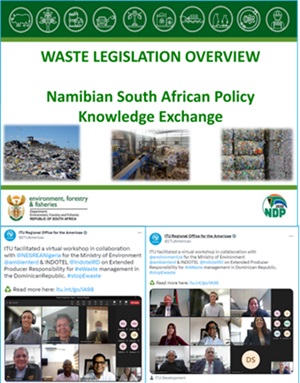
Regional approaches to facilitate the collection of comparable e-waste data and statistics and to encourage the harmonization of policy and regulation across borders for the management of e-waste are important. The transition to a circular economy for electronics requires cross-border collaboration and the economies of scale that can result from a regional policy and data collection approach. ITU and its partners provide support to countries with regional alignment through training and capacity building.
Regional E-waste Data Harmonization in East Africa
In collaboration with the EACO secretariat, ITU and the UNITAR-SCYCLE Programme - founding partners of the Global E-waste Statistics Partnership (GESP) - provided technical assistance to EACO member states through the 'EACO Regional E-waste Data Harmonization' project. The project supports the relevant strategic actions of the Regional E-waste Management Strategy, notably to track progress and its achievement and to harmonize the collection of e-waste data regionally. This will eventually result in a central database on e-waste within the EACO secretariat.
The project ran from the March 2021 to December 2022 and focused on the following key activities:
- Harmonized surveys: developing regional baseline surveys for households and businesses.
- Inception training: supporting national statistics bodies to collect and improve e-waste data and statistics in a harmonized manner.
- Regional trial: trailing the harmonized household and business surveys in each of the 6 EACO member states.
- Validation training: validating country data through comparing and learning from preliminary results.
- Publication: publishing an East Africa E-waste Baseline study focuses on survey and training results. This collaborative study “Towards the harmonization of data collection - A baseline study for e-waste in East Africa” aims to enhance the quality, collection, and interpretation of e-waste data in East Africa, specifically in Burundi, Kenya, Rwanda, South Sudan, Tanzania, and Uganda.

Regional E-waste Data Harmonization in the Western Balkans
The Western Balkan countries, including Albania, Bosnia and Herzegovina, Montenegro, North Macedonia, and Serbia, are witnessing a surge in E-waste, mirroring global trends. The joint ITU-UNEP-UNITAR Regional E-waste Monitor for the Western Balkans collects internationally comparable e-waste statistics in the region. This report delves into the characteristics of this increase, such as technological innovations and a growing middle class. Offering factual insights, it meticulously analyzes statistics, key stakeholders, current policies, legislation, technological practices, and societal interdependencies. The report not only highlights the challenges but provides recommendations to address the E-waste issue effectively.

Notably, the region has experienced a 67% increase in E-waste generation since 2010, reaching 0.15 Mt in 2021, with a collection rate at 27%. Despite specific legislation and Extended Producer Responsibility (EPR) schemes in place, challenges persist, including incomplete EPR implementation and inadequate infrastructure. The report’s six recommendations advocate for preventative measures, awareness, enhanced collection, improved treatment, safety measures, fair compensation, and increased training to foster a holistic approach across all stakeholders in the region. This report aims to guide policymakers, industries, and communities toward sustainable E-waste management practices.
Knowledge Exchanges on E-waste Regulatory Methods
 To boost the opportunities for harmonization within regions and across regions, ITU provides a platform for countries to exchange on particular topics related to the development and implementation of e-waste regulation.
To boost the opportunities for harmonization within regions and across regions, ITU provides a platform for countries to exchange on particular topics related to the development and implementation of e-waste regulation.
Such knowledge exchanges provide a very valuable opportunity for governments and private sector players to exchange and share lessons learned and ask questions to one another about key aspects of regulating e-waste and forging collaboration between government and the electronics industry.